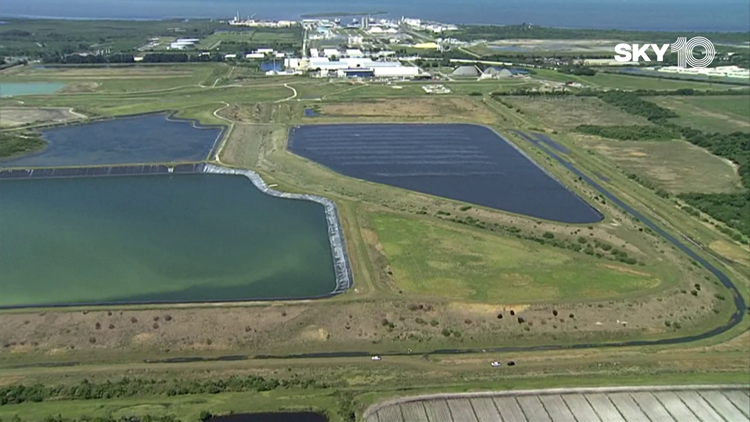With the recent scare at Piney Point, we’ve heard about phosphogypsum stacks and heard about how risky they can be for our environment.
So, why do we have them?
Phosphogypsum might sound like something from a sci-fi movie, but what is it really?
“So, the process for making phosphate fertilizer involves taking this soft rock phosphate and mixing it with sulfuric acid. The byproduct is gypsum, the mineral gypsum. It’s a calcium sulphate mineral and it is produced as a byproduct of this mine. You’re roughly in a 5-1, so about five tons of phosphogypsum are formed for every ton of phosphoric acid that’s made. So, it’s a very large byproduct of this process," Dr. Matt Pasek, a professor in the School of Geosciences at USF, explained to 10 Investigates' Jenna Bourne.
So why do we need phosphorous anyway?
It’s an important part of fertilizer, which means it’s crucial for food production. But, is acquiring phosphate worth the risk? Dr. Pasek says yes.
“Yes, in general… Roughly, of the 7 billion people on the earth, 6 billion are fed through the use of fertilizers such as nitrogen and phosphorous fertilizers.”
According to Pasek, about 70 percent of all phosphorous in the US comes from Florida because we have that soft rock phosphate.
So, it’s actually more ecologically friendly to mine it in our state because we don’t have to blow up rocks with dynamite or anything like that to get it.
When asked if there is any replacement for phosphorous, Dr. Pasek said "honestly, no. There is no way of having fertilizer not have phosphorous in it.”
Phosphate rock also contains uranium, thorium and radium. All of that comes out as waste which, according to the EPA, eventually decays to radon, a radioactive gas.
And, that's what is in the phosphogypsum stacks we keep hearing about that could pose a threat if they're released into the environment.
According to the EPA, Phosphate rock mining is the fifth largest mining industry in the United States. The phosphate industry is concentrated in the southeastern United States.
About 90 percent of phosphate is mined in Florida, North Carolina, and Tennessee.
More info on this topic can be found on the Earth Institute/Columbia University site.
What other people are reading right now:
- Getting your second dose of COVID-19 vaccine? Here's what to expect
- Prince Philip, husband of Britain’s Queen Elizabeth II, dead at 99
- Pumping of wastewater from Piney Point put on pause
- Man sentenced to 24 years in prison for killing of mom, baby in 2018 Bayshore crash
- Hurricane experts predict an above-average Atlantic hurricane season in 2021
- Rays Up! Here's everything you need to know about the Tampa Bay Rays home opener today
►Breaking news and weather alerts: Get the free 10 Tampa Bay app
►Stay In the Know! Sign up now for the Brightside Blend Newsletter



